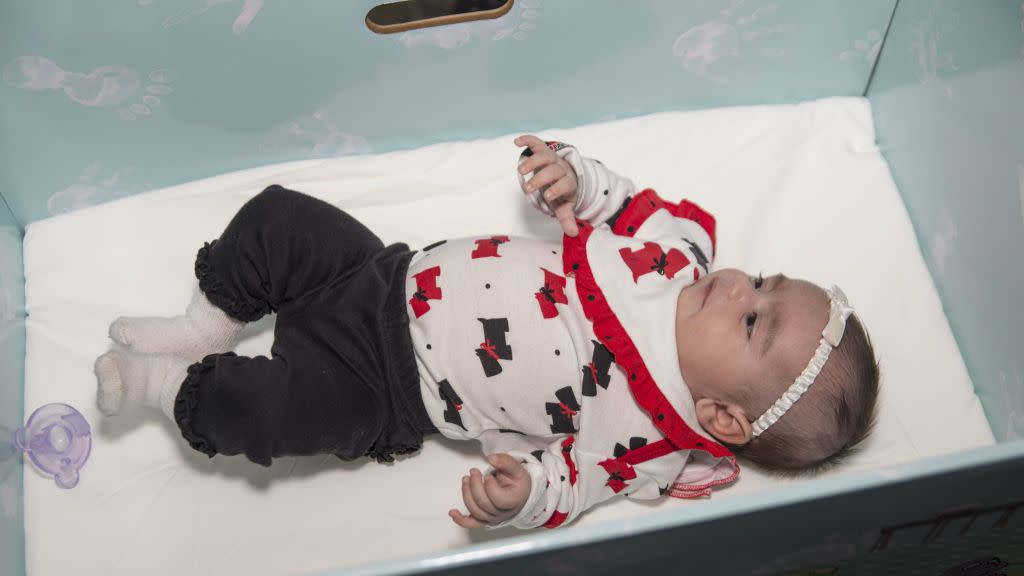Finland’s adorable and much-envied “baby boxes” are making a debut in the US

In 1938, Finland started offering low-income mothers a “maternity package,” a box filled with fabric to sew baby clothes, blankets and cloth diapers which doubled as a small crib for the baby’s first few weeks of life. Today, every Finnish mother, regardless of income, gets a baby box. When Finland introduced its baby boxes, the infant mortality rate was 65 deaths per 1,000 live births: Today it is 1.3 deaths per 1,000 births, one of the lowest in the world.
These Finnish baby boxes, now with over 50 adorable Scandinavian-designed items, including a snowsuit, have become the envy of new parents the world over.
Now the baby box is going global. On Jan. 26, New Jersey became the first US state to offer all new mothers in the state baby boxes. By the end of March, all of Canada will be handing them out, as are a few health care trusts in the UK, and some hospitals in Ireland. Temple University Hospital in Philadelphia last year gave away 3,000 baby boxes.
The Baby Box Co., which sells baby boxes for $70 to $225 and is based in Los Angeles, will supply 105,000 boxes—the expected number of babies to be born—to the state of New Jersey, paid for in part by a grant from the US Center for Disease Control.
A key goal is to lower the infant mortality rate, which is shockingly high in the United States—6.5 deaths per 1,000 live births—putting it in 23rd place in the world and way behind most industrialized countries. Last year, 93 percent of deaths due to SIDS were related to sleep complications, according to a New Jersey Child Fatality and Near Fatality Review Board report (pdf).
The key to the box is not actually the box, but the education that parents are required to get before they are given the box. In Finland, every woman is entitled to a free box once she has received prenatal care and parenting information from a healthcare professional. In the New Jersey program, women will have to register online, review a curriculum on newborn care and take a short quiz before they get their box.
“It’s not that Finland was transformed by cardboard boxes,” said Jennifer Clary, chief executive of The Baby Box Co. “It’s that they led with education and community support.”
There is ample scientific research to show that parenting programs help improve infants’ outcomes in life, but it can be hard to engage parents. The baby box is a classic behavioral “nudge” to do just that. The education programs can impart information on everything from health issues to car seats, local support services to why read to your kids a lot. Topics covered in the New Jersey curriculum include safe sleeping, the dangers of alcohol and substance abuse, the benefits of breast-feeding, and warning signs for postpartum depression.
Content is developed locally and in conjunction with health experts and state or national health authorities. It is then housed on babyboxuniversity.com.
The new Jersey boxes will contain diapers, a onesie, baby wipes, breast pads, and nipple cream for nursing mothers. Baby Box Co. has also teamed up with Vroom, an app developed by Amazon to help parents become “better brain builders.” Included in the box are Vroom-designed activity cards, explaining the importance of things like singing and talking to babies.

Finnish parents have the option of the baby box or a one-time grant of €140 ($150), though most opt for the box. It’s worth more, and it’s cool.
As Olga Tarasalainen, a spokeswoman for Kela, the Social Insurance Institution of Finland which distributes the boxes, told the Independent: “What the box symbolises is that every child is equal and deserves an equal start in life.”
So far, it looks like the idea might gain traction. Before the baby Box Co. even announced that its deal with New Jersey, news of the deal leaked and 4,000 parents signed up. “There’s a real need for parents to feel supported in the US, especially at a time when so many things are up in the air,” said Clary.
It’s worth noting that New Jersey’s boxes do not come with Finland’s other wonderful social safety net benefits—such as 16 weeks of paid leave and the ability to leave work seven weeks before the baby even arrives. New Jersey parents are probably even more envious of those benefits than the baby boxes. But for now, a box will have to do.

Sign up for the Quartz Daily Brief, our free daily newsletter with the world’s most important and interesting news.
More stories from Quartz:

